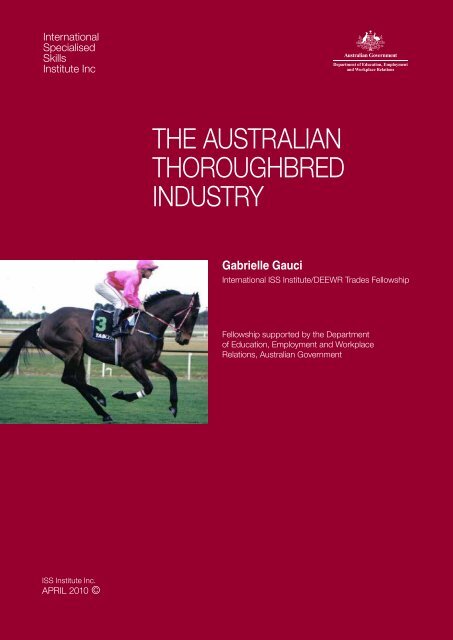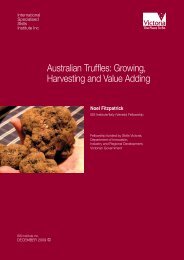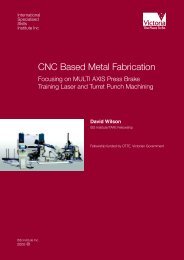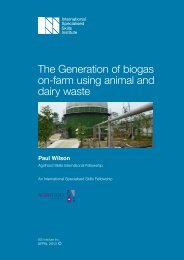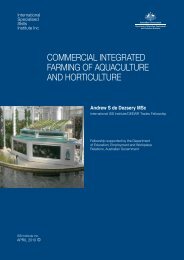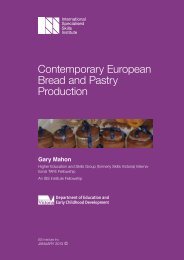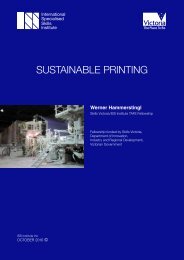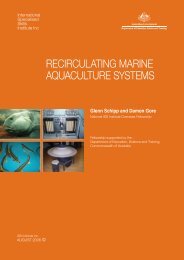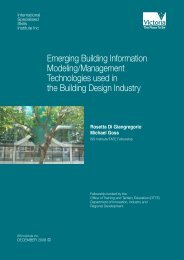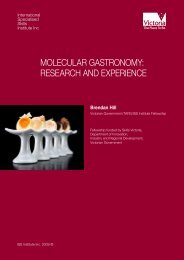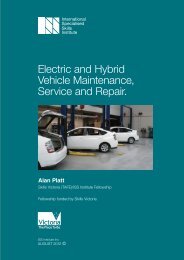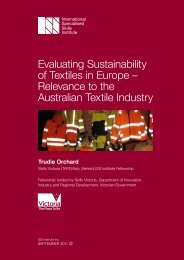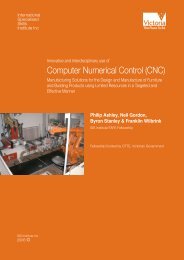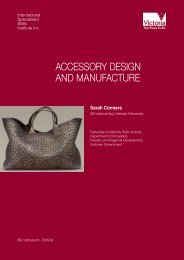the australian thoroughbred industry - International Specialised ...
the australian thoroughbred industry - International Specialised ...
the australian thoroughbred industry - International Specialised ...
You also want an ePaper? Increase the reach of your titles
YUMPU automatically turns print PDFs into web optimized ePapers that Google loves.
<strong>International</strong><br />
<strong>Specialised</strong><br />
Skills<br />
Institute Inc<br />
THE AUSTRALIAN<br />
THOROUGHBRED<br />
INDUSTRY<br />
. 1<br />
Gabrielle Gauci<br />
<strong>International</strong> ISS Institute/DEEWR Trades Fellowship<br />
1 A<br />
2 B<br />
Fellowship supported by <strong>the</strong> Department<br />
of Education, Employment and Workplace<br />
Relations, Australian Government<br />
ISS Institute Inc.<br />
APRIL 2010 ©
<strong>International</strong><br />
<strong>Specialised</strong><br />
Skills<br />
Institute<br />
ISS Institute<br />
Suite 101<br />
685 Burke Road<br />
Camberwell Vic<br />
AUSTRALIA 3124<br />
Telephone<br />
03 9882 0055<br />
Facsimile<br />
03 9882 9866<br />
Email<br />
issi.ceo@pacific.net.au<br />
Web<br />
www.issinstitute.org.au<br />
Published by <strong>International</strong> <strong>Specialised</strong> Skills Institute, Melbourne.<br />
ISS Institute<br />
101/685 Burke Road<br />
Camberwell 3124<br />
AUSTRALIA<br />
April 2010<br />
Also extract published on www.issinstitute.org.au<br />
© Copyright ISS Institute 2010<br />
This publication is copyright. No part may be reproduced by any process except in accordance with<br />
<strong>the</strong> provisions of <strong>the</strong> Copyright Act 1968. This project is funded by <strong>the</strong> Australian Government under <strong>the</strong><br />
Strategic Intervention Program which supports <strong>the</strong> National Skills Shortages Strategy. This Fellowship<br />
was funded by <strong>the</strong> Australian Government through <strong>the</strong> Department of Education, Employment and<br />
Workplace Relations. The views and opinions expressed in <strong>the</strong> documents are those of <strong>the</strong> Authors and<br />
do not necessarily reflect <strong>the</strong> views of <strong>the</strong> Australian Government Department of Education, Employment<br />
and Workplace Relations. Whilst this report has been accepted by ISS Institute, ISS Institute cannot<br />
provide expert peer review of <strong>the</strong> report, and except as may be required by law no responsibility can be<br />
accepted by ISS Institute for <strong>the</strong> content of <strong>the</strong> report, or omissions, typographical, print or photographic<br />
errors, or inaccuracies that may occur after publication or o<strong>the</strong>rwise. ISS Institute does not accept<br />
responsibility for <strong>the</strong> consequences of any actions taken or omitted to be taken by any person as a<br />
consequence of anything contained in, or omitted from, this report.
Executive Summary<br />
The purpose of this Fellowship was to research access points to achieve <strong>the</strong> goal of greater<br />
internationalisation of employment opportunities for <strong>thoroughbred</strong> <strong>industry</strong> support staff<br />
and for <strong>the</strong> Australian Thoroughbred Industry to become more aware of and integrate with<br />
<strong>the</strong> international <strong>thoroughbred</strong> <strong>industry</strong>. The Fellow found without exception interest in <strong>the</strong><br />
Australian Thoroughbred Industry. This led to additional meetings and an expansion of <strong>the</strong><br />
initial itinerary.<br />
The Fellowship involved a study tour of England and Ireland where meetings were arranged<br />
with European Thoroughbred Industry leaders in order to capture solutions for world’s<br />
‘best practice’ in <strong>the</strong> education streams catering to <strong>thoroughbred</strong> <strong>industry</strong> personnel.<br />
The European model of training offers accredited courses that are not available through<br />
Australian Vocational Education and Training and Higher Education institutions. The areas<br />
where we have skills deficiencies, such as skilled trackwork riders are better addressed in<br />
<strong>the</strong> European racing sector. The Fellowship enabled a thorough analysis of <strong>the</strong> structure<br />
implemented by <strong>the</strong> British Horse Racing Authority and <strong>the</strong> British Horse Racing Education<br />
Standards Trust. This coalition provides a unique introductory course for new entrants to<br />
<strong>the</strong> <strong>thoroughbred</strong> <strong>industry</strong>, a model that would offer considerable benefit to <strong>the</strong> Australian<br />
Thoroughbred Industry.<br />
Each year sees more horses bred and raced across many countries around <strong>the</strong> world.<br />
On occasion, it has been found that due to varying statutory requirements, including visa<br />
and licensing regulations, handlers have been restricted from traveling with <strong>the</strong>se horses.<br />
Such restrictions negate effective and caring horse handling and management. The last<br />
decade has profiled <strong>thoroughbred</strong> racing as an elite sport and all involved are deemed to<br />
be professionals. To maintain this level of professionalism, education and training will need<br />
to continue as a key role in ensuring that horses are cared for by people who understand<br />
<strong>the</strong>ir needs and have <strong>the</strong> skills to meet <strong>the</strong>m.<br />
In 2008 Australia completed three years of consultation, revision and reaccreditation of <strong>the</strong><br />
National Racing Industry Training Package that has produced <strong>the</strong> current training package<br />
(Australian National Racing Industry Training Package RGR08). In 2010 our European<br />
colleagues are conducting a review of <strong>the</strong>ir National Vocational Qualification (NVQ) and as a<br />
result of consultation with <strong>the</strong> Fellow will use <strong>the</strong> Australian National Racing Industry Training<br />
Package RGR08 (RGR08) as a point of reference.<br />
After meeting with key representatives from <strong>the</strong> European Thoroughbred Industry, it became<br />
evident that by establishing an international mapping matrix of respective training programs<br />
we can produce mutually recognised qualifications for licensing purposes between countries<br />
and establish an international training program agreement to address future needs.
Table<br />
of Contents<br />
i<br />
ii<br />
Abbreviations and Acronyms<br />
Definitions<br />
1 Acknowledgements<br />
1 Awarding Body – <strong>International</strong> <strong>Specialised</strong> Skills Institute (ISS Institute)<br />
2 Fellowship Supporter<br />
2 Supporters<br />
2 Organisations Impacted by <strong>the</strong> Fellowship<br />
4 About <strong>the</strong> Fellow<br />
6 Aims of <strong>the</strong> Fellowship Programme<br />
7 The Australian Context<br />
12 Identifying <strong>the</strong> Skills Deficiencies<br />
14 SWOT Analysis<br />
15 The <strong>International</strong> Experience<br />
15 Overview – English Racing<br />
16 Overview – Irish Racing<br />
17 England: The British Horseracing Authority (BHA)<br />
18 England: British Racing School (BRS)<br />
19 England: Nor<strong>the</strong>rn Racing College (NRC)<br />
19 England: British Horse Racing Education and Standards Trust (BHEST)<br />
20 England: National Association of Stable Staff (NASS)17<br />
21 England: IEPUK and LANTRA<br />
22 England: Thoroughbred Breeders Association (TBA)21<br />
23 England: National Trainers Federation (NTF)23<br />
24 Ireland: Irish National Stud25<br />
24 Ireland: Racing Academy and Centre of Education (RACE)26<br />
25 Ireland: Irish Racehorse Trainers Association (IRTA)27<br />
26 Ireland: Horse Racing Ireland (HRI)28 and The Turf Club29<br />
26 Ireland: Aga Khan Studs30<br />
28 Knowledge Transfer: Applying <strong>the</strong> Outcomes<br />
31 Recommendations<br />
31 Government<br />
31 Education and Training<br />
32 Industry<br />
33 Community<br />
33 ISS Institute
Abbreviations<br />
and Acronyms<br />
i<br />
ANTA<br />
ARB<br />
BHA<br />
BHEST<br />
BRS<br />
DEEWR<br />
EARS<br />
EQUES<br />
FETAC<br />
GOTAFE<br />
HEROS<br />
HRI<br />
IEPUK<br />
INTSCA<br />
ISSA<br />
ISS Institute<br />
LANTRA<br />
NCEE<br />
NRC<br />
NVQ<br />
OHS<br />
PCA<br />
PCAV<br />
RACE<br />
RGR08<br />
ROR<br />
RVL<br />
TAB<br />
TBA<br />
TBV<br />
VET<br />
Australian National Training Authority<br />
Australian Racing Board<br />
British Horse Racing Authority<br />
British Horse Racing Education Standards Trust<br />
British Racing School<br />
Department of Education, Employment and Workplace Relations<br />
European Association of Racing Schools<br />
European Qualification of Employees of Stables<br />
Fur<strong>the</strong>r Education and Training Awards Council<br />
Goulburn Ovens Institute of TAFE<br />
Homing of Ex-Racehorses Organisation Scheme<br />
Horse Racing Ireland<br />
<strong>International</strong> Exchange Programs UK<br />
<strong>International</strong> Skills Competence Program<br />
Irish Stable Staff Association<br />
<strong>International</strong> <strong>Specialised</strong> Skills Institute Inc.<br />
UK Sector Skills Council for Land Based Training<br />
National Centre for Equine Education<br />
Nor<strong>the</strong>rn Racing College<br />
National Vocational Qualification<br />
Occupational Health and Safety<br />
Pony Club Australia<br />
Pony Club Association of Victoria<br />
Racing Academy and Centre of Education<br />
Australian National Racing Industry Training Package entitled RGR08<br />
Retraining of Racehorses<br />
Racing Victoria Limited<br />
Totalizator Agency Boards<br />
Thoroughbred Breeders Australia<br />
Thoroughbred Breeders Victoria<br />
Vocational Education and Training
Definitions<br />
ii<br />
Innovation<br />
Design<br />
Creating and meeting new needs with new technical and design styles<br />
(new realities of lifestyle).<br />
Reference: ‘Sustainable Policies for a Dynamic Future’, Carolynne Bourne<br />
AM, ISS Institute 2007.<br />
Design is problem setting and problem solving.<br />
Design is a fundamental economic and business tool. It is embedded<br />
in every aspect of commerce and <strong>industry</strong> and adds high value to any<br />
service or product - in business, government, education and training and<br />
<strong>the</strong> community in general.<br />
Reference: ‘Sustainable Policies for a Dynamic Future’, Carolynne Bourne<br />
AM, ISS Institute 2007.<br />
Skills deficiency A skill deficiency is where a demand for labour has not been recognised<br />
and where accredited courses are not available through Australian higher<br />
education institutions. This demand is met where skills and knowledge<br />
are acquired on-<strong>the</strong>-job, gleaned from published material, or from working<br />
and/or study overseas.<br />
There may be individuals or individual firms that have <strong>the</strong>se capabilities.<br />
However, individuals in <strong>the</strong> main do not share <strong>the</strong>ir capabilities, but ra<strong>the</strong>r<br />
keep <strong>the</strong> IP to <strong>the</strong>mselves; and over time <strong>the</strong>y retire and pass away. Firms<br />
likewise come and go.<br />
Reference: ‘Directory of Opportunities. <strong>Specialised</strong> Courses with Italy.<br />
Part 1: Veneto Region’, ISS Institute, 1991.<br />
Sustainability<br />
Trainer<br />
Stablehand<br />
The ISS Institute follows <strong>the</strong> United Nations NGO on Sustainability,<br />
“Sustainable Development is development that meets <strong>the</strong> needs of <strong>the</strong><br />
present without compromising <strong>the</strong> ability of future generations to meet<br />
<strong>the</strong>ir own needs”<br />
Reference: http://www.unngosustainability.org/CSD_Definitions%20SD.htm<br />
A racehorse trainer is a person who is licensed to operate a business that<br />
trains horses under racing <strong>industry</strong> regulated licensing criteria for <strong>the</strong> purpose<br />
of competing in <strong>industry</strong>-regulated events. The trainer is responsible for <strong>the</strong><br />
welfare, maintenance and racing performance of <strong>the</strong> animals. The trainer<br />
is responsible for designing training and racing programs for <strong>the</strong> equine<br />
athlete. Trainers are required to act for owners in advising on <strong>the</strong> purchase of<br />
livestock. This requires detailed knowledge of pedigree, conformation and<br />
animal physiology.<br />
Also known as a stable employee, a stablehand is a person who is employed<br />
in a <strong>thoroughbred</strong> racing stable and whose prime function is to care for<br />
<strong>the</strong> animals and to meet <strong>the</strong>ir individual needs, such as feeding, grooming,<br />
exercising and transporting; as well as keeping <strong>the</strong> environment safe, clean<br />
and hygienic. The stablehand works under <strong>the</strong> direction of a trainer or stable<br />
supervisor. The stablehand works as part of a team and in some situations<br />
is able to act autonomously in a limited capacity.
Definitions<br />
iii<br />
Track Rider<br />
Jockey<br />
Steward<br />
Breeder/<br />
Stud Manager<br />
Owner<br />
A track rider is a person who is employed to exercise <strong>thoroughbred</strong> horses<br />
on <strong>the</strong> instruction of a trainer. These exercising duties require judgement<br />
and <strong>the</strong> ability to interpret and relay information concerning horse health,<br />
performance and temperament accurately to <strong>the</strong> trainer as well as high-level<br />
riding skills.<br />
A jockey is an independent professional sportsperson licensed by<br />
<strong>thoroughbred</strong> racing <strong>industry</strong> authorities to compete in <strong>industry</strong>-regulated<br />
competitions. A jockey must possess <strong>the</strong> highest level of race riding and<br />
horse handling skills, which requires problem solving skills in unpredictable<br />
circumstances. The communication of performance and fitness of <strong>the</strong> horse<br />
to trainers and owners at <strong>the</strong> end of a race is a critical part of <strong>the</strong> jockey’s<br />
role. This requires in-depth understanding of anatomy, physiology and<br />
health of <strong>the</strong> horse applied in <strong>the</strong> context of a competitive environment.<br />
A Steward ensures that <strong>the</strong> integrity of racing is upheld. A steward will<br />
supervise <strong>the</strong> conduct of race meetings; investigate incidents and potential<br />
non-compliance issues, as well as arbitrating and awarding penalties under<br />
<strong>the</strong> principles of administrative law. An extensive knowledge of <strong>the</strong> rules of<br />
racing; application of appropriate penalties, racing protocols, animal welfare<br />
and duty of care requirements are all part of this role.<br />
A horse breeder requires an extensive knowledge of pedigrees, animal<br />
welfare issues, business management and <strong>the</strong> rules and regulations<br />
pertaining to <strong>the</strong> breeding of <strong>thoroughbred</strong>s. This role is responsible for<br />
<strong>the</strong> foundation of <strong>the</strong> <strong>thoroughbred</strong> <strong>industry</strong> through pedigree match ups,<br />
coverings, foaling down and <strong>the</strong> development of <strong>the</strong> foal to produce <strong>the</strong><br />
‘product’ that races for billions worldwide.<br />
An owner is <strong>the</strong> client of a trainer or stud manager who pays for <strong>the</strong> service<br />
of having <strong>the</strong>ir horse bred or prepared for professional competition. An<br />
owner has <strong>the</strong> responsibility of knowing and understanding not only <strong>the</strong><br />
welfare needs of <strong>the</strong> horses that <strong>the</strong>y own but also <strong>the</strong>ir obligations to <strong>the</strong><br />
business of <strong>the</strong> trainer or stud manager.
Acknowledgements<br />
1<br />
Gabrielle Gauci would like to thank <strong>the</strong> following individuals and organisations who gave<br />
generously of <strong>the</strong>ir time and <strong>the</strong>ir expertise to assist, advise and guide her throughout <strong>the</strong><br />
Fellowship programme.<br />
Awarding Body – <strong>International</strong> <strong>Specialised</strong> Skills Institute (ISS<br />
Institute)<br />
The <strong>International</strong> <strong>Specialised</strong> Skills Institute Inc is an independent, national organisation<br />
that for over two decades has worked with Australian governments, <strong>industry</strong> and education<br />
institutions to enable individuals to gain enhanced skills and experience in traditional trades,<br />
professions and leading-edge technologies.<br />
At <strong>the</strong> heart of <strong>the</strong> Institute are our Fellows. Under <strong>the</strong> Overseas Applied Research<br />
Fellowship Programme <strong>the</strong> Fellows travel overseas. Upon <strong>the</strong>ir return, <strong>the</strong>y pass on<br />
what <strong>the</strong>y have learnt by:<br />
1. Preparing detailed reports to government departments, <strong>industry</strong> and education institutions.<br />
2. Recommending improvements to accredited educational courses.<br />
3. Offering training activities including workshops, conferences and forums.<br />
Over 180 Australians have received Fellowships, across many <strong>industry</strong> sectors.<br />
Recognised experts from overseas also conduct training activities and events. To date, 22<br />
leaders in <strong>the</strong>ir field have shared <strong>the</strong>ir expertise in Australia.<br />
According to Skills Australia’s ‘Australian Workforce Futures: A National Workforce<br />
Development Strategy 2010’:<br />
Australia requires a highly skilled population to maintain and improve our economic position in<br />
<strong>the</strong> face of increasing global competition, and to have <strong>the</strong> skills to adapt to <strong>the</strong> introduction of<br />
new technology and rapid change.<br />
<strong>International</strong> and Australian research indicates we need a deeper level of skills than currently<br />
exists in <strong>the</strong> Australian labour market to lift productivity. We need a workforce in which more<br />
people have skills, but also multiple and higher level skills and qualifications. Deepening skills<br />
across all occupations is crucial to achieving long-term productivity growth. It also reflects<br />
<strong>the</strong> recent trend for jobs to become more complex and <strong>the</strong> consequent increased demand<br />
for higher level skills. This trend is projected to continue regardless of whe<strong>the</strong>r we experience<br />
strong or weak economic growth in <strong>the</strong> future. Future environmental challenges will also create<br />
demand for more sustainability related skills across a range of industries and occupations. 1<br />
In this context, <strong>the</strong> Institute works with Fellows, <strong>industry</strong> and government to identify specific<br />
skills in Australia that require enhancing, where accredited courses are not available through<br />
Australian higher education institutions or o<strong>the</strong>r Registered Training Organisations. The<br />
Fellows’ overseas experience sees <strong>the</strong>m broadening and deepening <strong>the</strong>ir own professional<br />
practice, which <strong>the</strong>y <strong>the</strong>n share with <strong>the</strong>ir peers, <strong>industry</strong> and government upon <strong>the</strong>ir return.<br />
This is <strong>the</strong> focus of <strong>the</strong> Institute’s work.<br />
For fur<strong>the</strong>r information on our Fellows and our work see www.issinstitute.org.au.<br />
Patron in Chief<br />
Lady Primrose Potter AC<br />
Board Chairman<br />
Ms Noel Waite AO<br />
Board Members<br />
Mr Mark Bennetts<br />
Mr Franco Fiorentini<br />
Sir James Gobbo AC, CVO<br />
Mr John Iacovangelo<br />
Mr David Wittner<br />
Chief Executive Officer<br />
Mr Jeremy Irvine<br />
1 Skills Australia’s ‘Australian Workforce Futures: A National Workforce Development Strategy 2010’, pp. 1-2<br />
http://www.skillsaustralia.gov.au/PDFs_RTFs/WWF_strategy.pdf
Acknowledgements<br />
2<br />
Fellowship Supporter<br />
This Fellowship has been supported by <strong>the</strong> Department of Education, Employment and<br />
Workplace Relations (DEEWR), Australian Government.<br />
The Australian Government’s Department of Education, Employment and Workplace<br />
Relations (DEEWR) implements Government policies and programs to provide education and<br />
training opportunities for all Australians, to increase employment participation and to ensure<br />
fair and productive workplaces. Education, training and workforce participation are central to<br />
our goal of building a productive and socially inclusive nation, one which values diversity and<br />
provides opportunities for all Australians to build rewarding social and economic lives. Gauci<br />
would like to thank <strong>the</strong>m for providing funding support for this Fellowship.<br />
Supporters<br />
• AgriFood Skills Australia<br />
Arthur Blewitt, CEO<br />
• Aquanita Racing Limited<br />
Peter Oliver, CEO<br />
• Australian Racing Board<br />
Andrew Harding, CEO<br />
• Primary Industries Curriculum Maintenance Manager<br />
Kate Bryce, Executive Officer<br />
• Racing Industry Standing Committee<br />
Rod Thirkell-Johnston, Chairman<br />
• Rural Skills Australia<br />
Geoff Bloom, Executive Director<br />
David Forbes, Agri-Food National Industry Career Specialist<br />
• Racing Victoria Limited<br />
Bernard Saundry, COO<br />
• Racing Victoria Limited<br />
Michael Duffy, Chairman<br />
• Thoroughbred Breeders Australia<br />
Peter McGauran, CEO<br />
Organisations Impacted by <strong>the</strong> Fellowship<br />
Government<br />
• AgriFood Skills Australia<br />
• Department of Education, Employment and Workplace Relations<br />
• Local Government<br />
• State Offices of Gaming and Racing<br />
• Racing Appeals Tribunal<br />
• Regional Development Victoria<br />
• Rural Industries Research and Development Corporation
Acknowledgements<br />
3<br />
Industry<br />
• Australian Jockeys Association<br />
• Australian Racing Board<br />
• Australian Stud Book<br />
• Australian Thoroughbred Racehorse Owners Association<br />
• Australian Trainers Association<br />
• Greyhounds Australasia<br />
• Harness Racing Australia<br />
• Racing Information Services Australia<br />
• Tabcorp<br />
• Thoroughbred Breeders Australia<br />
Professional Organisations<br />
• Animal Health Australia<br />
• Australian Horse Industry Council<br />
• Australian Workers Union<br />
• Equine Veterinarians Australia<br />
Education and Training<br />
• Equine Training Provider Network<br />
• ISS Institute<br />
• Racing Industry Provider Network<br />
• Registered Training Organisations<br />
• Technical and Fur<strong>the</strong>r Education<br />
• Vocational Education and Training (VET) in School programs<br />
Community<br />
• Education and Training<br />
• Local Council<br />
• Local Primary Industry and Business<br />
• Local Racing Clubs<br />
• Local Sports and Recreation Departments<br />
O<strong>the</strong>r<br />
• Equestrian Federation of Australia<br />
• Pony Club Association of Australia
About <strong>the</strong> Fellow<br />
4<br />
Name: Gabrielle Gauci<br />
Employment<br />
• Stable Liaison and Education Officer, Racing Victoria Limited<br />
Qualifications<br />
• Licensed Apprentice Jockey, Victorian Racing Club 1979–1984<br />
• Licensed Racehorse Trainer, Victorian Racing Club 1989–1998,<br />
• Certificate – Initial Teacher Training GOTAFE 1997<br />
• Certificate IV – Workplace Place Assessor GOTAFE 1998<br />
• Licensed Assistant Trainer Singapore Turf Club, 1998–2001<br />
• TAA 40104 Certificate IV in Training and Assessment GOTAFE 2005<br />
• 21593VIC Level II First Aid GOTAFE 2006<br />
• RGR50102 Diploma of Racing University of Ballarat 2006<br />
• BSB41604 Certificate IV Occupational Health and Safety (OHS) GOATFE 2007<br />
• Licensed Racehorse Trainer, Victorian Racing Club 2009–ongoing<br />
Memberships<br />
• Certificate II Equine Industry Reaccreditation Working Party<br />
• Committee for Welfare of Racehorse Trainers and Stable Employees<br />
• Industry Champion for Racing – AgriFood Skills Australia<br />
• Racing Industry Community of Practice – Reframing <strong>the</strong> Future<br />
• Thoroughbred Racehorse Owners Association<br />
• Victoria Racing Industry Training Provider Network<br />
• Wangaratta Racehorse Trainers Association<br />
In a career spanning 36 years in <strong>the</strong> <strong>thoroughbred</strong> racing <strong>industry</strong> Gabrielle Gauci has<br />
accumulated a wealth of national and international experience, knowledge, skills and<br />
qualifications. Her career path began as a 10-year-old when she transferred her pony club<br />
riding skills to ride track work for local trainers in Wangaratta.<br />
In 1979 <strong>the</strong> Fellow became one of <strong>the</strong> first professional female apprentice jockeys in Australia,<br />
accumulating 86 winning race rides during her apprenticeship. She subsequently took<br />
up <strong>thoroughbred</strong> training and established Forbern Lodge Racing Stables in Wangaratta.<br />
Her success in producing 147 winners and two local premierships led to international<br />
appointments as an assistant trainer in leading stables in Mauritius and Singapore.<br />
In 1990 <strong>the</strong> Fellow became a sessional teacher at Goulburn Ovens Institute of TAFE<br />
(GOTAFE) and pioneered equine courses at her racing stables. These courses proved to be<br />
popular, with over 400 stable employees and trainers achieving formal qualifications under<br />
her guidance. The rapid growth of <strong>the</strong>se programs formed <strong>the</strong> basis of a new business<br />
division of GOTAFE. The National Centre for Equine Education (NCEE) offers a suite of<br />
formal courses for stable employees, horse breeding and equine vet nursing.
About <strong>the</strong> Fellow<br />
5<br />
In 2005 an Outstanding Achievement Award in Training for <strong>the</strong>ir Primary Industries Division<br />
was presented to <strong>the</strong> Fellow by GOTAFE.<br />
The Fellow has been instrumental in developing and driving <strong>the</strong> National Racing Industry<br />
Training Package, ensuring that it meets <strong>industry</strong> needs and standards. In 2005 AgriFood<br />
Skills Australia appointed <strong>the</strong> Fellow a ‘Champion for Racing’. This has provided her a<br />
platform to mesh <strong>the</strong> relevant vocational and training curricula with <strong>the</strong> practical needs of<br />
<strong>the</strong> racing <strong>industry</strong>.<br />
In <strong>the</strong> 2006 <strong>the</strong> Fellow established <strong>the</strong> inaugural ‘Victorian Thoroughbred Employee of <strong>the</strong><br />
Year Awards.’ As a result of <strong>the</strong> Fellow’s advocacy regarding <strong>the</strong> importance of, and <strong>the</strong><br />
need for a skilled workforce in order to meet future needs, <strong>the</strong> Australian Racing Board, as<br />
a matter of policy, called on each peak <strong>industry</strong> body to explore skills benchmarking for <strong>the</strong><br />
licensing of various racing <strong>industry</strong> roles. Between 2006 and 2009 <strong>the</strong> Fellow was employed<br />
by Racing Victoria Limited as Stable Liaison/Education Officer.
Aims of <strong>the</strong> Fellowship Programme<br />
6<br />
The Fellowship had four objectives:<br />
1. Inspire innovation in relation to <strong>the</strong> development of a unique international partnership for<br />
racing <strong>industry</strong> workers.<br />
2. Determine current ‘best practice’ maintenance techniques used in <strong>the</strong> management<br />
of linking compulsory qualifications to <strong>the</strong> licensing or registration of stable employees<br />
within <strong>the</strong> <strong>thoroughbred</strong> horse racing <strong>industry</strong>.<br />
3. Become skilled in constructing a suitable foundation and bridging course for new and<br />
existing workers that meets <strong>the</strong> specific standards of <strong>the</strong> <strong>thoroughbred</strong> <strong>industry</strong> and that<br />
is both nationally and internationally recognised.<br />
4. Become skilled in identifying <strong>the</strong> requirements of establishing a successful stable<br />
employee association for workers of <strong>the</strong> <strong>thoroughbred</strong> <strong>industry</strong>.
The Australian Context<br />
7<br />
Thoroughbred racing involves horses ridden by jockeys on racetracks primarily over<br />
distances from 800 to 3,200 metres. Most races are conducted over flat courses but <strong>the</strong>re<br />
are also a number of hurdle and steeplechase races, and <strong>the</strong>se normally range from 2,800<br />
to 5,500 metres.<br />
The term ‘<strong>thoroughbred</strong>’ comes from <strong>the</strong> strict control of <strong>the</strong> breeding of <strong>the</strong> horses.<br />
Thoroughbred racing is <strong>the</strong> second most popular spectator sport in Australia (second to<br />
Australian Rules Football or AFL) with <strong>the</strong> Melbourne Cup being <strong>the</strong> most widely known event. 2<br />
The Australian Thoroughbred Industry employs over 240,000 people, 77,000 of whom are<br />
full-time employees. Thoroughbred horse racing injects over $7.7 billion dollars into <strong>the</strong><br />
Australian economy annually.<br />
Australia has more racecourses than any o<strong>the</strong>r country and has <strong>the</strong> second largest number<br />
of starters behind <strong>the</strong> USA. The Australian Racing Industry offers <strong>the</strong> third largest prize<br />
money in <strong>the</strong> world. In <strong>the</strong> 2007–08 season horses competed for a share of $375,512,579<br />
million dollars.<br />
The size and reach of <strong>the</strong> Australian Racing Industry is verified in <strong>the</strong> following statistics. 3<br />
Racing<br />
• 8 principal racing authorities<br />
• 339 race clubs<br />
• 330 racetracks<br />
• 2,302 meetings annually<br />
• 17,211 individual races<br />
• 29,972 horses raced<br />
• 4,782 trainers<br />
• 1,065 jockeys<br />
• 15,121 stablehands<br />
• $12,642,540,000 wagered on <strong>thoroughbred</strong> racing alone.<br />
Breeding<br />
• 819 registered stallions stood for stud fees ranging from $5,000–$350,000 per service<br />
• 29,075 broodmares were covered<br />
• 17,818 live foals were born<br />
• 1,223 weanlings sold<br />
• 4,903 yearlings sold ($2,700,000 top price paid for an Encosta De Lago colt)<br />
2 Inquiry into <strong>the</strong> Viability of <strong>the</strong> Victorian Thoroughbred/Standardbred Breeding Industries (2003–2006)<br />
3 Australian Racing Fact Book 2007/08, Australian Racing Board
The Australian Context<br />
8<br />
Australian Thoroughbred Foal Crop Distribution 2007–08 4<br />
The Australian Racing Board (ARB) is <strong>the</strong> only authority empowered to mandate practices,<br />
conditions and integrity standards for racing throughout Australia. Regulation of racing is <strong>the</strong><br />
responsibility of racing bodies in each state and territory to ensure that racing is conducted<br />
at all levels with <strong>the</strong> utmost integrity.<br />
Racing <strong>industry</strong> occupations include owners, trainers, breeders, stewards, farriers, stable<br />
employees, jockeys and track riders. The racing <strong>industry</strong> Supply Chain also extends to<br />
farmers who grow and supply <strong>the</strong> feed, racing equipment manufacturers and retailers, as<br />
well as race club staff, caterers, cooks, waiters and bar attendants who work at racing<br />
venues, bookmakers, professional punters, veterinarians, manufacturers of <strong>the</strong>rapeutic<br />
substances, analytical laboratories and scientists who conduct equine research from funds<br />
provided by <strong>the</strong> racing <strong>industry</strong>. State and Territory Governments have a direct interest in<br />
<strong>the</strong> health and fur<strong>the</strong>r development of <strong>the</strong> Australian Racing Industry. This is acknowledged<br />
through <strong>the</strong> appointment of State and Territory Government ministers with specific portfolio<br />
responsibilities for <strong>the</strong> racing and gaming <strong>industry</strong>. Significant State and Territory Government<br />
revenue is generated through <strong>the</strong> operation of Totalizator Agency Boards (TABs).<br />
Industry consultation undertaken in <strong>the</strong> mid 1980s by <strong>the</strong> Australian National Training<br />
Authority (ANTA) identified <strong>the</strong> need to improve <strong>the</strong> education and skill level of <strong>industry</strong><br />
participants working at grass roots level. The research highlighted an extremely high accident<br />
rate among employees who worked hands-on with horses. Insurance premiums continued<br />
to rise as accident claims were made. Contributing to this consultation were members of<br />
Thoroughbred Breeders Australia (TBA) who oversee and regulate <strong>the</strong> breeding sector of<br />
<strong>the</strong> <strong>industry</strong>, <strong>the</strong>y provided information on job roles in <strong>the</strong>ir sector.<br />
The Australian Racing Board (ARB) provided information on <strong>the</strong> roles within <strong>the</strong> racing<br />
<strong>industry</strong>. There was a clear overlap in many roles, and even now, over 25 years later, no<br />
attempt has been undertaken to merge those roles and encourage cross-skilling.<br />
4 Australian Racing Fact Book 2007/08, Australian Racing Board
The Australian Context<br />
9
The Australian Context<br />
10<br />
ANTA subsequently worked with <strong>the</strong> <strong>industry</strong> to develop a set of accredited courses for <strong>the</strong><br />
racing <strong>industry</strong> to provide clear career paths and formal qualification recognition for <strong>industry</strong><br />
workers. This was <strong>the</strong> genesis of <strong>the</strong> first National Racing Industry Training Package:<br />
RGR98. The initial package offered nationally recognised certificates for stablehands, track<br />
riders, jockeys and trainers. However, as <strong>industry</strong> participants had little understanding of<br />
<strong>the</strong> TAFE system or <strong>the</strong> importance of qualifications, <strong>the</strong> rate of uptake was disappointing.<br />
Never<strong>the</strong>less, it was an important turning point.<br />
As <strong>the</strong> <strong>industry</strong> came to better understand and appreciate <strong>the</strong> benefits of formal training<br />
and qualifications, it was decided that <strong>the</strong> best way <strong>the</strong>se could be delivered was by skilling<br />
experienced <strong>industry</strong> participants to deliver flexible training programs in <strong>the</strong> workplace. The<br />
larger stables in particular realised <strong>the</strong> benefits of professional development courses for<br />
<strong>the</strong>ir staff. The outcome was <strong>the</strong> beginning of a cultural change within <strong>the</strong> <strong>industry</strong> that<br />
steadily embraced formal staff training and qualifications.<br />
In 2001 Racing Victoria Limited (RVL) became <strong>the</strong> first racing authority to implement<br />
compulsory qualifications (using <strong>the</strong> Certificate IV and Diploma qualifications from <strong>the</strong><br />
National Racing Industry Training Package) for <strong>the</strong> licensing of trainers and <strong>the</strong> RVL<br />
Apprentice Jockey Schools began delivering Certificate IV Jockey for <strong>the</strong>ir students.<br />
Due to <strong>the</strong> range and complexity of <strong>the</strong> breeding sector, courses relating to breeding<br />
are made up of units from <strong>the</strong> Rural Production Training Package RTE03 and <strong>the</strong> state<br />
accredited curriculum. These courses are expensive to deliver because practical lessons<br />
require a simulated stud environment. Consequently, <strong>the</strong>y can only be offered in a few<br />
geographical areas. Students who complete breeding-related courses are well regarded<br />
and sought after by breeders.<br />
An upgrade of <strong>the</strong> Racing Training Package took place after stakeholder consultation in late<br />
2001 with regard to make training more relevant to contemporary <strong>industry</strong> requirements,<br />
resulting in <strong>the</strong> RGR02 package. The most recent review conducted by AgriFood Skills<br />
Australia resulted in <strong>the</strong> Australian National Racing Industry Training Package entitled<br />
RGR08 (RGR08) training package. Endorsed in July 2008, The RGR08 package caters for<br />
<strong>the</strong> <strong>industry</strong> as a whole, inclusive of harness and greyhound racing. It also covers racing<br />
administration, track management and <strong>industry</strong>/professional integrity.<br />
The RGR08 package will be reviewed on a regular basis to ensure continuous improvement<br />
to reflect <strong>the</strong> ever-changing <strong>industry</strong> needs and standards. RVL are currently preparing<br />
to link compulsory qualifications from RGR08 as a requirement for <strong>the</strong> registration of<br />
stable employees and track riders by August 2011. To ensure people are provided with <strong>the</strong><br />
necessary skills and knowledge to do <strong>the</strong>ir job to <strong>the</strong> highest standards of professionalism<br />
and safety, RVL is establishing standards that will lift <strong>the</strong> profile of career paths and<br />
professional advancement throughout <strong>the</strong> <strong>industry</strong>.<br />
Fur<strong>the</strong>r linking between formal qualifications and registration for o<strong>the</strong>r sectors of <strong>the</strong> <strong>industry</strong><br />
is on <strong>the</strong> RVL agenda. In this regard, <strong>the</strong> establishment of appropriate national skill and<br />
knowledge benchmarks for licensing of stable employees should be given priority. Those<br />
involved in <strong>the</strong> daily care of horses should be provided with appropriate formal training to<br />
ensure consistent high standards. No o<strong>the</strong>r Australian state or territory, o<strong>the</strong>r than Victoria,<br />
has yet set stable employee qualification benchmarks for licensing purposes.
The Australian Context<br />
11<br />
Throughout Australia, most qualifications from <strong>the</strong> National Racing Industry Training Package<br />
are delivered through <strong>the</strong> TAFE system or <strong>the</strong> peak <strong>industry</strong> body, if <strong>the</strong>y are registered<br />
as a private training provider. For example, in preparation for <strong>the</strong> impending mandatory<br />
training link to registration and licensing of <strong>industry</strong> roles in Victoria, RVL has partnered with<br />
selected TAFE providers to streng<strong>the</strong>n <strong>the</strong> delivery of education and training in <strong>the</strong> Victorian<br />
<strong>thoroughbred</strong> racing <strong>industry</strong>. East Gippsland TAFE, National Centre of Equine Education,<br />
Nor<strong>the</strong>rn Melbourne Institute of TAFE, South West TAFE and University of Ballarat have all<br />
been recognised as preferred providers.<br />
Training courses currently offered in Australia are as follows:<br />
Racing<br />
Through TAFE and Approved Registered Training Organisations:<br />
• Certificate II – Stablehand<br />
• Certificate III – Advanced Stablehand<br />
• Certificate III – Track Rider<br />
• Certificate IV – Jockey<br />
• Certificate IV – Owner/Trainer<br />
• Diploma of Racing – Permit Trainer<br />
Breeding<br />
Through TAFE:<br />
• Diploma of Equine Stud Management<br />
• Bachelor of Equine Studies<br />
Equestrian<br />
Through TAFE:<br />
• Certificate II – Equine Industry<br />
• Diploma of Equine Performance Management<br />
• Diploma of Horse Business Management<br />
Through Private Providers:<br />
• Equestrian Federation of Australia Horse Management Certificate<br />
Through Pony Club Australia (non-accredited):<br />
• A,B,C,C star, D, D star, E, H and K certificates<br />
Equine Health<br />
Through TAFE:<br />
• Certificate Equine Vet Nursing<br />
• Certificate III – Farrier<br />
Through Private Providers:<br />
• Equine Acupuncture<br />
• Equine Dentistry<br />
• Equine Chiropractor
Identifying <strong>the</strong> Skill Deficiencies<br />
12<br />
There are in excess of 15,000 registered stable employees working in <strong>the</strong> Australian<br />
Thoroughbred Industry; <strong>the</strong> vast majority of whom have not undertaken training, or have<br />
not been formally inducted into <strong>the</strong>ir role or offered training in order to meet current<br />
<strong>industry</strong> needs.<br />
At present no Australian state or territory in Australia requires new or existing stable<br />
employees to have any type of training or qualification in order to be registered to perform<br />
<strong>the</strong>ir job. Racing Victoria Limited (RVL) are currently working towards compulsory training<br />
requirements for registration of all stable employees to be implemented as of August 2011.<br />
The lack of formally qualified staff working within <strong>the</strong> stable environment is of great concern<br />
to employers and <strong>the</strong> <strong>industry</strong> as a whole. The new generation of worker is seeking training<br />
and professional development opportunities as part of <strong>the</strong>ir employment and career journey.<br />
In October 2006 <strong>the</strong> Australian Racing Board (ARB) adopted a policy position that all principle<br />
racing authorities in Australia should make plans to apply qualification requirements to <strong>the</strong><br />
licensing of stable employees. In November 2007, Dr Harriet Speed, Principal Research<br />
Investigator for Victoria University, published The Study into <strong>the</strong> Health and Welfare of<br />
Racehorse Trainers and Stable Employees. 5 Recommendation 6 in this report addressed<br />
<strong>the</strong> need for more formal education and training of stable employees:<br />
Set compulsory minimum standards of basic horsemanship for all stable employee positions<br />
and explore options for appropriate training and assessment of those standards.<br />
More than any o<strong>the</strong>r <strong>industry</strong> stakeholder, stable employees spend <strong>the</strong> most time caring<br />
for and overseeing each individual <strong>thoroughbred</strong> throughout <strong>the</strong>ir entire racing career.<br />
Establishing and implementing an internationally recognised benchmark of skills and<br />
knowledge would cement a stronger foundation for an <strong>industry</strong> that in <strong>the</strong> past has been<br />
looked upon as offering unstable and unskilled careers. The internationalisation of <strong>the</strong><br />
<strong>industry</strong> has opened up opportunities for stable employees to travel.<br />
One of <strong>the</strong> skill deficiencies identified was <strong>the</strong> absence of appropriate educational and<br />
<strong>industry</strong> methodologies. To address this deficiency it is essential that effective linkages<br />
between formal stable employee training and appropriate licensing be established within<br />
<strong>the</strong> Australian Thoroughbred Industry. In order to make a clear recommendation of how to<br />
address this deficiency it is necessary to conduct an investigation of what o<strong>the</strong>r countries<br />
have in place.<br />
Ano<strong>the</strong>r deficiency identified with some new entrants to <strong>the</strong> Australian Thoroughbred<br />
Industry was <strong>the</strong> lack of knowledge and skills required for employment in racing and o<strong>the</strong>r<br />
equine disciplines. The absence of appropriate educational methodologies for <strong>the</strong> ‘holistic’<br />
equine <strong>industry</strong> leaves Australia with a fractured system for young horse lovers to find <strong>the</strong>ir<br />
vocation within <strong>the</strong> industries. This often leaves <strong>the</strong> participant with few known options if<br />
<strong>the</strong> role <strong>the</strong>y have commenced in is not suitable. A new foundation course would allow<br />
participants to have experience and investigate various roles and disciplines prior to entry.<br />
With <strong>the</strong>se generic skills <strong>the</strong>y could be given direct credits and opportunity for higher<br />
qualifications in <strong>the</strong> various disciplines offered.<br />
5 The Study into <strong>the</strong> Health and Welfare of Racehorse Trainers and Stable Employees. http://eprints.vu.edu.au/749/1/<br />
trainer_book_2008.pdf
Identifying <strong>the</strong> Skill Deficiencies<br />
13<br />
In order to address <strong>the</strong>se identified skill deficiencies, <strong>the</strong> Fellow arranged a comprehensive<br />
schedule of meetings and discussions in England and Ireland. The overseas component of<br />
<strong>the</strong> Fellowship had <strong>the</strong> following specific objectives:<br />
• Conduct analysis and record information sourced via visitations.<br />
• Observe and conduct an interviews with <strong>industry</strong> leaders to gain an appreciation of<br />
strategies and techniques that have determined <strong>the</strong> successful linking of qualifications to<br />
<strong>the</strong> registration/licensing of all stable employees throughout England and Ireland. These<br />
techniques have successfully provided clear pathways from Certificate I to Diploma and<br />
cross-skilling opportunities for new and existing workers within <strong>the</strong> <strong>industry</strong>.<br />
• Review monitoring and evaluation processes carried out since <strong>the</strong> development of <strong>the</strong><br />
European foundation course, to determine what amendments have been necessary over<br />
time. Establish if <strong>the</strong>re are o<strong>the</strong>r components in this course that may have been omitted.<br />
• Analyse <strong>the</strong> structure implemented by <strong>the</strong> British Horse Racing Authority (BHA) British<br />
Horse Racing Education Standards Trust and <strong>the</strong> British Horse Racing Education<br />
Standards Trust (BHEST), who provide a successful nine-week introductory course for<br />
new entrants to <strong>the</strong> <strong>thoroughbred</strong> <strong>industry</strong>. This course provides participants with <strong>the</strong><br />
key skills and knowledge required for licensing and registration standards.<br />
• Determine European system of successful recruitment through affiliations with <strong>the</strong> wider<br />
equine industries.<br />
• Distinguish certificates and courses available to <strong>the</strong> wider equine <strong>industry</strong> in Europe that<br />
act as ‘feeder’ courses into higher equine qualifications.<br />
• Determine <strong>the</strong> possibility of establishing an international agreement to formulate a<br />
process of mutual recognition between countries for licensing of stable employees in<br />
order to address future needs.<br />
• Conduct interviews with successful <strong>industry</strong> employee associations in England and<br />
Ireland to identify a viable model for <strong>the</strong> Australian Thoroughbred Industry.<br />
• Determine opportunities to share associations’ constitutional rights between countries<br />
to enable members to be represented when working internationally.<br />
• Analyse successful methods of protecting, advising, educating and promoting <strong>the</strong><br />
basic rights of all stable staff within <strong>the</strong> <strong>thoroughbred</strong> <strong>industry</strong>. Identify factors related to<br />
building a sustainable, ‘best practice’ <strong>thoroughbred</strong> employee support service, which is<br />
financially viable for an <strong>industry</strong> worker.<br />
• Determine infrastructure required for establishing an affiliation for cross-skilling<br />
scholarships within <strong>the</strong> <strong>thoroughbred</strong> <strong>industry</strong> between countries.
Identifying <strong>the</strong> Skill Deficiencies<br />
14<br />
SWOT Analysis<br />
Strengths<br />
• Strong provider network with <strong>the</strong> ability to communicate well with all stakeholders<br />
• Support from Vocational and Educational Training system<br />
• Support from Government – AgriFood Skills Australia,<br />
• State Racing Minister, Skills Victoria<br />
• Flexible workforce<br />
• Existing knowledge base<br />
• Global networks with key players<br />
• Excellent job swap and scholarship opportunities<br />
• Addressing Occupational Health and Safety (OHS) issues<br />
Weaknesses<br />
• Industry reluctance to change<br />
• Lack of local research and development<br />
• Labour intensive with few opportunities to streamline with new technology<br />
Opportunities<br />
• New national/international program<br />
• World’s ‘best practice’<br />
• Ability to build on established projects and outcomes<br />
• Career development<br />
• Promotes sustainability<br />
• Transferable skills<br />
• Ability to expand networks and support services<br />
• Define roles and pathways<br />
• Encourage o<strong>the</strong>r equine <strong>industry</strong> participants to consider racing as a career of choice<br />
and cross skill<br />
• Recruitment and retention opportunities<br />
• Educating participants about <strong>industry</strong> opportunities<br />
Threats<br />
• Continued funding availability<br />
• Registered Training Organisation (RTO) fees<br />
• Industry reluctance to embrace change<br />
• Bio-security (Regulation and governance requirements)
The <strong>International</strong> Experience<br />
15<br />
Overview – English Racing<br />
The <strong>thoroughbred</strong> <strong>industry</strong> in England employs 88,000 people both directly and indirectly,<br />
and is one of Britain’s largest sporting employers. The British Horseracing Authority (BHA)<br />
is <strong>the</strong> single governing body for British horseracing. The role of <strong>the</strong> BHA is to regulate,<br />
promote and represent <strong>the</strong> sport. The <strong>industry</strong> in Britain is complex, highly professional and<br />
multi-skilled with its component parts entirely interdependent. All new stable employees are<br />
given compulsory training prior to being registered with <strong>the</strong> BHA. The British Horseracing<br />
Education and Standards Trust (BHEST) is <strong>the</strong> awarding body for <strong>the</strong> National Vocational<br />
Qualification (NVQ) in <strong>the</strong> <strong>thoroughbred</strong> <strong>industry</strong>. Registered stable employees in Britain<br />
are entitled to a 4.85 per cent of <strong>the</strong> overall prize money earned by horses racing from <strong>the</strong>ir<br />
employer’s yard.<br />
British racing is steeped in tradition and can trace its historical involvement in <strong>the</strong> <strong>industry</strong><br />
back many centuries. ‘The General Stud Book’, which holds breeding records, was<br />
first printed in England in 1793 and from this publication we can now trace all modern<br />
<strong>thoroughbred</strong>s back to three stallions imported into England from <strong>the</strong> Middle East in <strong>the</strong><br />
late 17th and early 18th centuries: <strong>the</strong> Byerley Turk (1680s), <strong>the</strong> Darley Arabian (1704) and<br />
<strong>the</strong> Godolphin Arabian (1729).<br />
The British Racing Industry is enjoying substantial growth both locally and in <strong>the</strong> international<br />
market place.<br />
The 2008 Annual Report of <strong>the</strong> BHA highlights <strong>the</strong> size of <strong>the</strong> <strong>industry</strong>. 6<br />
Racing<br />
• 1 Principal Racing Authority(BHA)<br />
• 61 racetracks<br />
• 1,424 meetings annually<br />
• Prize money: £106.2 million<br />
• 9,494 individual races<br />
• 15,154 horses in training<br />
• 756 trainers<br />
• 421 jockeys<br />
• 7,948 stable employees<br />
Breeding<br />
• 345 registered stallions stood for stud fees<br />
• 10,740 broodmares reported to be at stud<br />
• 5,920 live foals were born in 2008<br />
Ireland is <strong>the</strong> third largest producer of <strong>thoroughbred</strong>s worldwide and hosts some of <strong>the</strong><br />
biggest and most prestigious breeding operations to be found in <strong>the</strong> equine world. The<br />
world’s largest <strong>thoroughbred</strong> stud, Coolmore, has its main base in Ireland.<br />
6 British Horseracing Authority 2008 Annual Report
The <strong>International</strong> Experience<br />
16<br />
Overview – Irish Racing<br />
Horse racing and breeding supports 16,500 jobs, mainly in rural Ireland. Ireland is<br />
recognised as <strong>the</strong> ‘Harvard University’ of all equine training and education. People from<br />
far away countries such as China, Japan, New Zealand, Australia, America, Brazil, Arabia,<br />
Russia and <strong>the</strong> Ukraine flock to <strong>the</strong> prestigious training centers of education that are based<br />
in Ireland. The Racing Academy and Centre of Education (RACE) established in 1973 and<br />
<strong>the</strong> Irish National Stud Thoroughbred Breeding course established in 1971, are <strong>the</strong> most<br />
respected educational centers in Ireland.<br />
All stable staff are registered with <strong>the</strong> Turf Club and become automatic members of <strong>the</strong> Irish<br />
Stable Staff Association (ISSA). A percentage of <strong>the</strong> betting turnover profits from Betfair are<br />
put into a stable staff pool. This is a bonus that is paid to all registered stable employees<br />
four times a year.<br />
In 2008, Ireland exported in excess of 5,000 horses to more than 30 countries worldwide<br />
worth €180 million.<br />
The 2008 ‘Horse Racing Ireland Fact Book’ provides <strong>the</strong> following <strong>industry</strong> statistics: 7<br />
Racing<br />
• Racing in Ireland is governed by Horse Racing Ireland (HRI) and regulated by The Turf Club<br />
• 26 racetracks<br />
• 342 meetings annually<br />
• Prize money: €60,401,250<br />
• 2,454 individual races<br />
• 12,119 horses in training<br />
• 778 trainers<br />
• 261 jockeys<br />
• 3,535 stable employees<br />
Breeding<br />
• 312 registered stallions stood for stud fees<br />
• 20,038 broodmares reported to be at stud<br />
• 12,419 live foals were born in 2008<br />
• 9,530 registered breeders<br />
The Fellow explored possible development over time of standardised curricula and<br />
appropriate protocols that would provide for a mutual recognition of <strong>industry</strong> workforce<br />
qualifications. The achievement of such an objective would enhance <strong>the</strong> skill base of <strong>the</strong><br />
<strong>industry</strong> in each of <strong>the</strong>se racing markets. It would also enhance possible career path<br />
opportunities for <strong>industry</strong> workforces by enabling people to have qualifications recognised<br />
on an international basis. To this end <strong>the</strong> Fellow visited <strong>the</strong> following organisations in England<br />
and Ireland.<br />
7 Horse Racing Ireland Fact Book 2008
The <strong>International</strong> Experience<br />
17<br />
England: The British Horseracing Authority (BHA) 8<br />
Contact: Sarah Hay-Jahans, Head of Industry Recruitment and Training<br />
BHA is <strong>the</strong> peak <strong>industry</strong> body for <strong>thoroughbred</strong> racing in Great Britain. The Recruitment<br />
and Training department play an active role in <strong>the</strong> training of participants entering <strong>the</strong><br />
<strong>industry</strong>. The recruitment team works closely with <strong>the</strong> British Racing School (BRS) and<br />
Nor<strong>the</strong>rn Racing College (NRC) to deliver programs for stable employees as part of <strong>the</strong><br />
licensing requirements.<br />
Objective<br />
• Determine <strong>the</strong> BHA model of mandatory training for new employees and <strong>the</strong>ir<br />
requirements for licensing of stable employees and <strong>industry</strong> participants.<br />
• Access <strong>the</strong> BHA’s experience and specific skills in order to contribute to developing<br />
internationally recognised foundation and bridging courses for new and existing workers<br />
in <strong>the</strong> Australian Thoroughbred Industry.<br />
Skills, Knowledge and Insights<br />
The BHA contributes to <strong>the</strong> funding of a vocational course offered to new stable employees<br />
aged 16–22 years. This is a full-time 9-week live-in course delivered through <strong>the</strong> BRS at<br />
Newmarket and <strong>the</strong> NRC in Doncaster. Both colleges issue <strong>the</strong> BHA licensing department<br />
with a list of students who complete each course. This allows <strong>the</strong> student to be registered<br />
once <strong>the</strong>y have graduated and are available for employment.<br />
The BHA has compulsory training modules attached to <strong>the</strong> licensing of trainers and jockeys.<br />
Stable employees who are registering as new employees are required to complete <strong>the</strong> NVQ<br />
Level I – Introduction to Racehorse Care, or <strong>the</strong> vocational course if eligible. Registered<br />
stable employees are automatic members of <strong>the</strong> National Association for Stable Staff<br />
(NASS) free of charge.<br />
The BHA funds welfare programs for re-education for jockeys, stablehands and trainers.<br />
It also engages with <strong>the</strong> wider equine community through associations with pony race<br />
meetings and pony clubs that are involved with programs, such as Retraining of Racehorses<br />
(ROR) 9 and <strong>the</strong> Homing of Ex-Racehorses Organisation Scheme (HEROS). 10<br />
Outcome<br />
The BHA is keen to work closely with <strong>the</strong> Fellow and o<strong>the</strong>r interested parties to develop<br />
mutual recognition of qualifications. Sarah Hay-Jahans advised <strong>the</strong> Fellow of BHA’s<br />
willingness to participate and indicated that mutual recognition of accredited qualifications<br />
for stable employees, jockeys, trainers and stewards would be extremely beneficial to both<br />
countries’ <strong>thoroughbred</strong> industries.<br />
8 www.britishhorseracing.com<br />
9 www.ror.org.uk<br />
10 www.heroscharity.org
The <strong>International</strong> Experience<br />
18<br />
England: British Racing School (BRS) 11<br />
Contact: Rory MacDonald, Chief Executive Officer<br />
BRS, in Newmarket, is acknowledged as one of <strong>the</strong> world’s leading providers of track<br />
rider training. BRS is one of <strong>the</strong> two British Horseracing Authority’s preferred training<br />
providers. 12 The original aim of <strong>the</strong> school was to provide purpose-built facilities to promote<br />
and encourage young people with potential to become professional jockeys. The school<br />
has subsequently developed as a centre of excellence for <strong>the</strong> racing <strong>industry</strong>.<br />
Rory MacDonald, <strong>the</strong> CEO, is an active member of <strong>the</strong> BHEST and is involved extensively in<br />
curriculum management. MacDonald is <strong>the</strong> current president of <strong>the</strong> European Association<br />
of Racing Schools (EARS). 13<br />
Objective<br />
• Analyse <strong>the</strong> BRS course delivery methods, with particular focus on <strong>the</strong> nine-week NVQ<br />
foundation course.<br />
• Explore partnership possibilities between <strong>the</strong> BRS and Australian racing RTOs.<br />
• Access BRS experience and specific skills in order to contribute to developing<br />
internationally recognised foundation and bridging courses for new and existing workers<br />
in <strong>the</strong> Australian Thoroughbred Industry.<br />
Skills, Knowledge and Insights<br />
The BRS training program commences with basic horse skills. Each student is allocated<br />
a horse to care for throughout <strong>the</strong> duration of <strong>the</strong> course. The school uses experienced,<br />
<strong>industry</strong>-based staff to deliver all courses and provides mentors for each student. The key<br />
to <strong>the</strong> success of this foundation course is <strong>the</strong> quality of <strong>the</strong> facilities and instructors. All<br />
students are taught to ride using simulators initially, <strong>the</strong>n on horses. Communication is<br />
maintained with riders at all times using headsets.<br />
The BRS is funded by <strong>the</strong> government, <strong>the</strong> racing <strong>industry</strong> and through charitable donations.<br />
The facilities are available to local communities and organisations for functions. The nineweek<br />
live-in vocational course is delivered in a ‘working stable’ environment. On completion<br />
of <strong>the</strong> course all students are provided work placement with registered trainers. The BRS<br />
has ten course intakes each year. The employment rate for BRS graduates is 95 per cent.<br />
Outcome<br />
MacDonald was impressed with Australia’s RGR08 package and indicated interest in <strong>the</strong><br />
BRS working with <strong>the</strong> Fellow and o<strong>the</strong>r organisations to look at developing an appropriate<br />
course for an <strong>International</strong> Thoroughbred Industry qualification. MacDonald also indicated<br />
<strong>the</strong> school would be interested in offering work placement opportunities to Australian<br />
graduates for short-term periods.<br />
11 www.brs.org.uk<br />
12 The o<strong>the</strong>r BHA preferred training provider is <strong>the</strong> Nor<strong>the</strong>rn Racing College.<br />
13 www.europeanracingschools.eu
The <strong>International</strong> Experience<br />
19<br />
England: Nor<strong>the</strong>rn Racing College (NRC) 14<br />
Contacts: Dawn Goodfellow, Chief Executive Officer; Joanne Ellis,<br />
Quality Manager; Malcolm Bygrave, Training Manager<br />
The NRC, in Doncaster, is a BHA preferred training provider. The college provides academystyle<br />
racing <strong>industry</strong> training. Course content is similar to that offered by <strong>the</strong> BRS, although with<br />
different delivery modes. NRC offers workplace-based training and flexible delivery options.<br />
Objective<br />
• Examine and assess variations in foundation course training methodologies and how<br />
mandatory training within <strong>the</strong> <strong>industry</strong> has impacted on student contact hours and<br />
<strong>industry</strong> acceptance.<br />
• Seek partnership possibilities for NRC and Australian racing RTOs<br />
Skills, Knowledge and Insights<br />
NRC provides <strong>industry</strong> training for racing workers including stable employees, trainers and<br />
amateur jockeys. The College has developed a more flexible model to deliver workplacebased<br />
training for existing stable employee roles and <strong>the</strong> NRC are looking to expand short<br />
courses to include racing operations and administration. The nine-week NVQ foundation<br />
course is delivered as a full-time live-in course, where riding is <strong>the</strong> main focus, followed by<br />
a fur<strong>the</strong>r nine-week workplace assessment.<br />
Dawn Goodfellow, CEO of <strong>the</strong> NRC, is also chair of <strong>the</strong> European Association of Racing<br />
Schools (EARS). 15 This Association represents training providers from England, Ireland,<br />
France, Italy and Germany and has been involved in discussions regarding establishing<br />
a set of standard qualifications for its membership countries. Goodfellow expressed<br />
interest in expanding <strong>the</strong> scope of EARS deliberations on mutual recognition of accredited<br />
qualifications to include <strong>the</strong> Australian Racing Industry.<br />
Outcome<br />
Goodfellow expressed interest in NRS and EARS working with <strong>the</strong> Fellow and <strong>the</strong> Australian<br />
Thoroughbred Industry to develop an appropriate course for an <strong>International</strong> Thoroughbred<br />
Industry qualification. Goodfellow is willing to assist, on behalf of Germany and Italy, in<br />
communications with <strong>industry</strong> stakeholders. The first step would involve mapping equine<br />
qualifications, namely <strong>the</strong>; National Vocational Qualification (NVQ), Fur<strong>the</strong>r Education and<br />
Training Awards Council certificates (FETAC), European Qualification of Employees of<br />
Stables (EQUES) and RGR08. Goodfellow also indicated that NRC would like to find an<br />
Australian racing provider to partner with to offer international placement for <strong>the</strong>ir students.<br />
England: British Horse Racing Education and Standards Trust<br />
(BHEST)<br />
Contacts: Judith Allen, Executive Director; Gill Greeves, Director of Qualifications<br />
The BHEST 16 is a government-recognised body that awards qualifications in <strong>the</strong> racing,<br />
breeding, equine and farrier industries.<br />
14 www.nor<strong>the</strong>rnracingcollege.co.uk<br />
<br />
15 www.europeanracingschools.eu<br />
16 www.bhest.co.uk
The <strong>International</strong> Experience<br />
20<br />
BHEST manages <strong>the</strong> racing <strong>industry</strong>’s education program, a scheme developed to open<br />
horse racing to a new, young audience through <strong>the</strong> use of exciting and informative educational<br />
activities based on national equine courses offered through vocational programs.<br />
Objective<br />
• To discuss <strong>the</strong> development of future NVQ requirements.<br />
• To present RGR08 as a guide to future training partnership possibilities and identify<br />
common goals in future qualification requirements.<br />
Skills, Knowledge and Insights<br />
Gill Greeves demonstrated to <strong>the</strong> Fellow how <strong>the</strong> original NVQ structure for equine courses<br />
was developed and explained that in 2010 all qualifications are to be reviewed to incorporate<br />
employability skills. Regular stakeholder communication toge<strong>the</strong>r with visits to training<br />
providers and employers ensures BHEST qualifications remain current and continue to<br />
meet <strong>industry</strong> standards.<br />
Outcome<br />
BHEST were open to innovative ideas to enhance <strong>the</strong> prospects of learners by building<br />
qualifications that can be transferable to o<strong>the</strong>r countries. BHEST could see <strong>the</strong> benefits<br />
of aligning with many aspects of <strong>the</strong> RGR08 in <strong>the</strong> future. Greeves indicated that with <strong>the</strong><br />
forthcoming re-writing of NVQ, BHEST would be willing to participate in any development of<br />
an international alliance of qualifications for <strong>the</strong> <strong>thoroughbred</strong> <strong>industry</strong> to identify common<br />
units between countries.<br />
England: National Association of Stable Staff (NASS) 17<br />
Contact: Jim Cornelius, Chief Executive Officer<br />
NASS represents <strong>the</strong> interests of stable employees. This was <strong>the</strong> first registered stable<br />
employee association in <strong>the</strong> world. NASS is committed to improving pay, conditions of<br />
service and <strong>the</strong> overall employment position of stable staff. It was previously called <strong>the</strong><br />
Stable Lads Association.<br />
Objective<br />
• Explore <strong>the</strong> requirements of setting up a successful association to protect <strong>the</strong> welfare of<br />
stable employees, and to discuss a future alliance between stable employee association<br />
members in Australia and Britain.<br />
Skills, Knowledge and Insights<br />
The original Stable Lads Association ceased to exist early in 2009. A new committee was<br />
appointed and re-branded as NASS. There is no charge to be a member as it is automatic<br />
on registration as a stable employee. The funding for this association is from <strong>the</strong> Levy<br />
board and comes from a small percentage of prize money. Full membership is established<br />
by signing a membership form and this entitles <strong>the</strong> member to legal representation at no<br />
fee, <strong>the</strong>se are deemed financial members. Signed memberships attract a subsidy from <strong>the</strong><br />
government to cover <strong>the</strong> extra entitlements.<br />
17 www.naoss.co.uk
The <strong>International</strong> Experience<br />
21<br />
NASS meets monthly with <strong>the</strong> National Trainers Federation (see below) and distributes<br />
a monthly newsletter to all members, keeping <strong>the</strong>m up to date with any rule changes,<br />
education opportunities, job vacancies and <strong>industry</strong> news. NASS supports <strong>the</strong> costs of any<br />
development training that a member takes on and ensures <strong>the</strong>y have support through <strong>the</strong><br />
process. In <strong>the</strong> near future <strong>the</strong> NASS hope to link qualifications to pay rates.<br />
Outcome<br />
Jim Cornelius discussed at length <strong>the</strong>ir constitution and offered his services to be a point<br />
of contact for any members of an association formed in Australia in <strong>the</strong> near future. NASS<br />
is willing to consider a reciprocal agreement between English and Australian members<br />
of stable staff associations once a proposal is drafted. Cornelius is keen on <strong>the</strong> idea of<br />
reciprocal membership services offered to members who are working or studying between<br />
countries. NASS would like an overview of employee training in Australia to highlight that<br />
education and training can be taken up in o<strong>the</strong>r countries when traveling with horses.<br />
England: IEPUK and LANTRA<br />
<strong>International</strong> Exchange Programs UK (IEPUK) 18 and UK Sector Skills Council for<br />
Land Based Training (LANTRA) 19<br />
Contacts: Vanessa Peach, Manager <strong>International</strong> Exchange Programs, IEPUK; George<br />
Peach, Project Manager, IEPUK; Steven Zaparaniuk, Project Development Manager, LANTRA<br />
IEPUK have a long history in equine and agriculture skills exchange programs and have<br />
developed a web-based <strong>International</strong> Skills Competence Program. 20 (INTSCA). LANTRA is<br />
<strong>the</strong> Sector Skills Council for <strong>the</strong> UK environmental and land-based sector.<br />
Objective<br />
• To seek advice on <strong>the</strong> possibility of establishing student exchanges through IEPUK and<br />
<strong>the</strong> linking of racing qualifications to <strong>the</strong>ir scope and INTSCA program.<br />
• To discuss with LANTRA <strong>the</strong> objectives of <strong>the</strong> Fellowship. Determine how best AgriFood<br />
Skills Australia and LANTRA could liaise on <strong>the</strong> possibility of sharing qualifications for<br />
<strong>the</strong> <strong>thoroughbred</strong> <strong>industry</strong>.<br />
Skills, Knowledge and Insights<br />
Vanessa Peach has a long solid background in international exchange programs. IEPUK<br />
is not just ano<strong>the</strong>r staff agency. They recruit worldwide and provide permanent, seasonal<br />
and trainee workers for all types of rural environments. IEPUK has developed a unique<br />
web-based international skills competence program that would fit well with <strong>the</strong> international<br />
<strong>thoroughbred</strong> qualification we are keen to develop. Vanessa Peach is also a migration agent<br />
and expressed interest in assisting with <strong>the</strong> development of a pilot program of job swaps for<br />
people working on <strong>thoroughbred</strong> studs in North East Victoria to swap with people working<br />
on studs in England and Ireland.<br />
18 www.lantra.co.uk<br />
19 www.iepuk.com<br />
20 www.intsca.com
The <strong>International</strong> Experience<br />
22<br />
Steven Zaparaniuk, LANTRA, explained how <strong>the</strong>ir training was rolled out for <strong>the</strong> environmental<br />
and land-based sector. They have a similar system to Australia and are very interested in<br />
working closely with AgriFood Skills Australia to enhance <strong>the</strong> training of both parties by<br />
sharing ‘best practice’.<br />
Outcome<br />
Both LANTRA and IEPUK would like to form an affiliation with AgriFood Skills Australia and<br />
be involved in <strong>the</strong> development of cross-country qualifications. LANTRA are keen to see<br />
what projects will come out of this Fellowship and willing to assist with <strong>the</strong> government<br />
requirements of accrediting an international racing qualification in <strong>the</strong> future.<br />
England: Thoroughbred Breeders Association (TBA) 21<br />
Contacts: Kirsten Rausing, Chair; Caroline Turnbull, Training and Recruitment Manager<br />
TBA is <strong>the</strong> only official body representing <strong>thoroughbred</strong> breeders in Great Britain. The TBA<br />
has always been actively involved in <strong>the</strong> broad range of issues affecting its members, all<br />
of which have a critical bearing on <strong>the</strong> health and wealth of British <strong>thoroughbred</strong> breeding.<br />
In 2008 TBA UK developed a web-based portal for breeders to display information on<br />
staff membership in order to have documented statistics of numbers of people working<br />
within <strong>the</strong> breeding sector. Most countries do not register stud staff, which gives a false<br />
employment head count for government issues, such as funding for educational programs<br />
in that sector. By ga<strong>the</strong>ring this information and registering stud staff, TBA gets a clearer<br />
picture of what will be required for future workforce development.<br />
Kirsten Rausing is one of <strong>the</strong> most influential people in British horse racing and sits on<br />
most committees associated with education and training for <strong>the</strong> <strong>industry</strong>. She is also <strong>the</strong><br />
Owner/Manager of Lanwades Stud 22 situated in Newmarket, England, where <strong>thoroughbred</strong><br />
racehorses have been bred for more than 300 years; Lanwades is one of <strong>the</strong> very few<br />
stallion studs in England.<br />
Lanwades Stud extends to over 515 acres and comprises 155 boxes, toge<strong>the</strong>r with 8<br />
isolation yards. During <strong>the</strong> season some 30 people ensure <strong>the</strong> smooth daily running of<br />
this prestigious stud. For a number of years Lanwades Stud has offered employment<br />
for Australian breeding scholarship winners. Kirsten Rausing’s passion for <strong>thoroughbred</strong><br />
breeding has been a driving force in <strong>the</strong> establishment of high quality education programs<br />
throughout <strong>the</strong> UK.<br />
Objective<br />
• To seek support in <strong>the</strong> formation of an international standardised qualification for <strong>the</strong><br />
<strong>thoroughbred</strong> <strong>industry</strong>.<br />
• To discuss UK initiative of databases for stud staff and linking of qualifications to stud<br />
staff roles.<br />
Skills, Knowledge and Insights<br />
Rausing was most informative in explaining <strong>the</strong> Breeding Industry throughout <strong>the</strong> UK.<br />
The economic climate has seen a huge change in breeding operations in <strong>the</strong> UK as most<br />
operations are now owned in large partnerships ra<strong>the</strong>r than by independent breeders.<br />
21 www.<strong>the</strong>tba.co.uk<br />
22 www.lanwades.com
The <strong>International</strong> Experience<br />
23<br />
Rausing is only one of two independent breeders remaining in Newmarket; where <strong>the</strong>re<br />
were previously up to 35 independent stud farms. Her incisive views on <strong>the</strong> benefits of<br />
professionally developing staff within an organisation supported <strong>the</strong> views expressed by<br />
<strong>the</strong> Fellow. Rausing emphasised <strong>the</strong> importance of knowledge of horse pedigrees as an<br />
important factor in <strong>the</strong> training of breeding staff.<br />
By offering a foundation course that covered <strong>the</strong> generic skills and knowledge of <strong>the</strong><br />
<strong>thoroughbred</strong> <strong>industry</strong> as a whole, this would enable staff to commute freely between <strong>the</strong><br />
breeding and racing sectors adding multiskilling to <strong>the</strong> <strong>industry</strong>.<br />
Outcome<br />
Rausing advised that Lanwades Stud would be delighted to work with <strong>the</strong> Fellow and<br />
be involved in a pilot program of staff swaps between countries to rekindle <strong>the</strong> breeding<br />
<strong>industry</strong> dreams of young staff looking to work, learn and travel.<br />
Caroline Turnbull allowed temporary database access to <strong>the</strong> Fellow in order to share<br />
knowledge for development of a similar program to be set up within Australia. A similar<br />
database in Australia would enable both countries to share information and align training<br />
requirements for future needs. Australia has no documented statistics of staff numbers<br />
working within <strong>the</strong> breeding sector in order to attract funding for staff training.<br />
England: National Trainers Federation (NTF) 23<br />
Contact: Chris Wall, 24 President<br />
Chris Wall is a leading UK trainer based in Newmarket. Wall is also <strong>the</strong> Chairman of <strong>the</strong> East<br />
Angila region of <strong>the</strong> National Trainers Federation (NTF) and in 2008 was elected President.<br />
The NTF represents <strong>the</strong> interests of racehorse trainers. It negotiates with o<strong>the</strong>r <strong>industry</strong><br />
bodies and relevant national agencies and organisations to provide up-to-date information<br />
to members about any matters affecting <strong>the</strong>ir business. The NTF offers access to a wide<br />
range of professional advisers including in-house legal advice.<br />
Objective<br />
• To discuss, from a racehorse trainers point of view, <strong>the</strong> results of current qualification<br />
requirements and <strong>the</strong>ir relevance to <strong>the</strong> stable.<br />
Skills, Knowledge and Insights<br />
Wall was most supportive of <strong>the</strong> current structure, but would like to see more workplace<br />
delivery of training and was enthusiastic about <strong>the</strong> prospect of an international qualification.<br />
Wall has seen <strong>the</strong> advantages of <strong>the</strong> track riding unit being a compulsory requirement of <strong>the</strong><br />
NVQ within his own stable environment.<br />
Outcome<br />
Wall expressed that <strong>the</strong> NTF are very proactive in encouraging staff training and believe a<br />
standard international program would benefit <strong>the</strong> <strong>industry</strong> as a whole.<br />
23 www.racehorsetrainers.org<br />
24 www.chriswallracing.co.uk
The <strong>International</strong> Experience<br />
24<br />
Ireland: Irish National Stud 25<br />
Contact: Sally Carroll, Qualification Manager<br />
The original Irish National Stud based in County Kildare, was established in 1946. The first<br />
<strong>thoroughbred</strong> breeding course was held at <strong>the</strong> Irish National Stud in 1971 and it remains<br />
<strong>the</strong> best-known, world respected equine training program to this day. The stud accepts<br />
breeding course scholarship winners from around <strong>the</strong> world. The stud also features <strong>the</strong><br />
world famous Japanese Gardens that attract tourists all throughout <strong>the</strong> year. It is <strong>the</strong><br />
peaceful retirement place of champion racehorse, Vintage Crop, which became <strong>the</strong> first<br />
international raider in 1993 to win <strong>the</strong> Melbourne Cup.<br />
Objective<br />
• To discuss <strong>the</strong> requirements for developing a suitable foundation and bridging course for<br />
new and existing workers that meet <strong>the</strong> specific standards of both Irish and Australian<br />
breeding <strong>industry</strong> requirements.<br />
Skills, Knowledge and Insights<br />
Sally Carroll believes that pedigree knowledge and analysis are paramount in <strong>the</strong><br />
development of any student studying <strong>the</strong> aspects of breeding. Due to <strong>the</strong> amount of<br />
international students that attend <strong>the</strong> scholarships, Carroll identified a distinct difference<br />
between student’s knowledge base depending on <strong>the</strong>ir country of origin. The variations<br />
found were knowledge of pedigrees, foaling down experience, and equine nutrition. All<br />
students are taken back through <strong>the</strong> basic steps of <strong>the</strong>ir introduction to breeding program<br />
on commencement, regarding <strong>the</strong>ir <strong>industry</strong> experience, to bridge <strong>the</strong> skill and knowledge<br />
gap. Carroll has had a long association with <strong>the</strong> Irish National Stud, heavily involved in<br />
mentoring international students, her opinion regarding an international foundation course<br />
was that it would be of huge benefit to <strong>the</strong> <strong>industry</strong> and would set a base for courses such<br />
as <strong>the</strong> Irish National Stud course.<br />
Outcome<br />
Carroll suggested that one generic qualification delivered internationally and modified to<br />
each countrys needs would give much more consistency and work opportunities in <strong>the</strong><br />
future. Carroll expressed interest in personally being included in any development to pursue<br />
a more consistent education model.<br />
Ireland: Racing Academy and Centre of Education (RACE) 26<br />
Contacts: Keith Rowe, Director; Helen O’Sullivan, Education Coordinator<br />
The Racing Academy and Centre of Education (RACE) is Ireland’s academy<br />
for <strong>the</strong> horse racing <strong>industry</strong> and an international centre of excellence.<br />
Objective<br />
• To explore <strong>the</strong> courses delivered through <strong>the</strong> RACE using <strong>the</strong> Fur<strong>the</strong>r Education and<br />
Training Awards Council (FETAC) and European Qualification of Employees of Stables<br />
(EQUES) qualification models and how this course compares to <strong>the</strong> NVQ and RGR08<br />
25 www.irish-national-stud.ie<br />
26 www.racingacademy.ie
The <strong>International</strong> Experience<br />
25<br />
Skills, Knowledge and Insights<br />
The RACE delivers <strong>the</strong> Trainee Jockey course. Established in 1977, <strong>the</strong> Trainee Jockey<br />
course is a 42-week residential program comprising three terms. The course is sponsored<br />
by Ireland’s National Training and Employment Authority (FÁS) and is free of charge to all<br />
EU citizens. All meals and accommodations are provided by <strong>the</strong> RACE, and trainees return<br />
home each weekend.<br />
The RACE also delivers <strong>the</strong> EQUES – a program of study undertaken by students of <strong>the</strong><br />
various EARS schools. It provides candidates who successfully complete language, riding<br />
and stable management modules with a passport, which will enable <strong>the</strong>m to work in <strong>the</strong><br />
racing <strong>industry</strong> in o<strong>the</strong>r European countries. The RACE also delivers training programs for<br />
HRI and <strong>the</strong> Turf Club for <strong>the</strong> licensing of jockeys, assistant trainers, trainers, farriers and<br />
stable employees.<br />
The RACE prides itself on providing <strong>the</strong> most comprehensive jockey program in <strong>the</strong> world.<br />
The RACE graduates include most of <strong>the</strong> current leading European riders.<br />
Outcome<br />
Keith Rowe and Helen O’Sullivan both expressed <strong>the</strong>ir support for <strong>the</strong> program outlined<br />
by <strong>the</strong> Fellow and willingly offered <strong>the</strong>ir services and expertise to fur<strong>the</strong>r develop an<br />
international mapping template of <strong>thoroughbred</strong> <strong>industry</strong> qualifications. The RACE has many<br />
international students who study <strong>the</strong>ir short course jockey program. They have offered to<br />
design a short program to accommodate Australian apprentice jockeys enabling <strong>the</strong>m to<br />
obtain international experience at <strong>the</strong>ir academy. The program would consist of five weeks<br />
live-in tuition and riding out for local trainers on The Curragh, which is one of <strong>the</strong> world’s<br />
most prestigious racetracks. There is also an opportunity for RACE graduates to do work<br />
placement in Australia for short periods of time in order to build <strong>the</strong>ir skill base and network.<br />
Ireland: Irish Racehorse Trainers Association (IRTA) 27<br />
Contact: Jim Kavanagh, CEO<br />
The Irish Racehorse Trainers Association (IRTA) is <strong>the</strong> representative body of licensed<br />
trainers in Ireland.<br />
The IRTA works closely with The RACE and <strong>the</strong> ISSA in placing staff with trainers and<br />
encouraging career pathways through <strong>the</strong> <strong>industry</strong>. There are approximately 420 members<br />
of <strong>the</strong> IRTA, and when a trainer receives a license <strong>the</strong>y automatically become a member.<br />
It is an all-Ireland body with members based in both <strong>the</strong> Republic and in Nor<strong>the</strong>rn Ireland.<br />
Objective<br />
• To discuss, from a racehorse trainers point of view, <strong>the</strong> results of current qualification<br />
requirements and <strong>the</strong>ir relevance to <strong>the</strong> stable.<br />
Skills, Knowledge and Insights<br />
Participation in staff training in Ireland is relatively new as it is not a licensing requirement.<br />
However, <strong>the</strong> association encourages trainers to professionally develop <strong>the</strong>ir staff where<br />
possible.<br />
27 www.irta.ie
The <strong>International</strong> Experience<br />
26<br />
Outcome<br />
Jim Kavanagh was impressed with <strong>the</strong> quality of RGR08 as it offered structured training to<br />
extended <strong>industry</strong> roles such as stewards, barrier attendants and racing administration. He<br />
immediately organised for <strong>the</strong> Fellow to meet with Horse Racing Ireland’s human resources<br />
and licensing departments.<br />
Ireland: Horse Racing Ireland (HRI) 28 and The Turf Club 29<br />
Horse Racing Ireland Contact: David Wright, Manager – Human Resources<br />
The Turf Club Contact: Seamus Gibson, Licensing Manager<br />
Horse Racing Ireland (HRI) is <strong>the</strong> overall administrator of Irish horseracing, and represents <strong>the</strong><br />
racing <strong>industry</strong> in international forums. The Turf Club is <strong>the</strong> regulatory body for horseracing<br />
in Ireland.<br />
Objective<br />
• To discuss <strong>the</strong> training requirements of additional roles such as stewards, barrier<br />
attendants and racing administrative roles.<br />
Skills, Knowledge and Insights<br />
The Irish Racing Industry is in <strong>the</strong> process of linking accredited training to various roles. At<br />
present <strong>the</strong> only resources available for workers is <strong>the</strong> FETAC training which currently does<br />
not include roles for stewards, barrier attendants and racing administrative roles. The Turf<br />
Club licensing manager works closely with <strong>the</strong> RACE in <strong>the</strong> training of stablehands, track<br />
riders, jockeys and trainers.<br />
Outcome<br />
Seamus Gibson expressed interest in <strong>the</strong> different roles offered throughout RGR08 package.<br />
The main roles <strong>the</strong>y were most excited about were stewards training and barrier attendant<br />
training. Gibson advised that <strong>the</strong> Turf Club would be interested in adopting <strong>the</strong> training<br />
outlined in RGR08 for <strong>the</strong>se roles. The Fellow will keep both Gibson and David Wright up to<br />
date with any development on an international qualification for <strong>the</strong> <strong>thoroughbred</strong> <strong>industry</strong> to<br />
ensure Ireland is part of <strong>the</strong> proposed program.<br />
Ireland: Aga Khan Studs 30<br />
Contact: Pat Downes, Director<br />
The Aga Khan Irish studs cover four properties: Gilltown, Sallymount, Sheshoon and Ballyfair<br />
(formerly known as Brownstown). Gilltown is <strong>the</strong> Aga Khan’s public stud, currently home to<br />
sires, Azamour and Dalakhani. Sallymount ajoins Gilltown and houses <strong>the</strong> Aga Khan’s postfoaling<br />
mares. The Aga Khan recognises that top trainers, jockeys, and stud managers are all<br />
of equal importance. Employees of <strong>the</strong> Aga Khan Studs are offered professional development<br />
opportunities including working at <strong>the</strong> owner’s o<strong>the</strong>r properties in Ireland and France.<br />
28 www.goracing.ie<br />
29 www.turfclub.ie<br />
30 www.agakhanstuds.com
The <strong>International</strong> Experience<br />
27<br />
Objective<br />
• To discuss <strong>the</strong> prospect of a future partnership between<br />
Aga Khan Stud’s Gilltown Stud and Thoroughbred<br />
Breeders Victoria in order to establish a pilot staff swap<br />
program.<br />
Skills, Knowledge and Insights<br />
The majority of staff employed on Aga Khan Studs have<br />
some level of formal training. Therefore, <strong>the</strong> possibility<br />
of offering international job swaps for staff who have<br />
completed <strong>the</strong>ir training proved most attractive as a rewards<br />
program. Pat Downes spent his learning years under<br />
Victorian-based Mike Becker, manager of Independent<br />
Stallions, and understands <strong>the</strong> value of gaining skills and<br />
knowledge in <strong>the</strong> <strong>thoroughbred</strong> <strong>industry</strong> while working in<br />
different countries.<br />
Outcome<br />
Downes advised that Gilltown Stud would be interested in participating in a pilot program<br />
in order to develop <strong>the</strong> process of staff swaps between countries. It was decided that<br />
<strong>the</strong> initial swaps could be offered to long-term employees who had undertaken training.<br />
These swaps would be set up between Gilltown Stud and Victorian Thoroughbred Breeders<br />
Association and affiliated members.
Knowledge Transfer:<br />
Applying <strong>the</strong> Outcomes<br />
28<br />
The Fellow has arranged a series of forums and workshops for <strong>the</strong> Australian Thoroughbred<br />
Racing Industry in order to:<br />
• Determine and codify current ‘best practice’ in linking compulsory qualifications to <strong>the</strong><br />
licensing or registration of stable employees<br />
• Construct a suitable foundation and bridging course for new and existing workers<br />
• Develop an international matrix of racing qualifications that meet <strong>the</strong> specific standards<br />
of <strong>the</strong> <strong>thoroughbred</strong> <strong>industry</strong> both nationally and international<br />
• Identify <strong>the</strong> requirements of establishing a successful stable employee association for<br />
workers within sectors of <strong>the</strong> <strong>thoroughbred</strong> <strong>industry</strong>.<br />
Type of Activity: Forum<br />
Role of <strong>the</strong> Fellow<br />
Aim of activity<br />
Facilitator: Presentation of Fellowship<br />
outcomes<br />
Develop a communication strategy to<br />
ensure consistency for mandatory training<br />
for stable employees.<br />
Target <strong>industry</strong> sectors and occupations • Racing Industry Standing Committee<br />
• Representatives from each state<br />
for <strong>industry</strong> training providers.<br />
Representatives of Australian Racing<br />
Board (ARB)<br />
• AgriFood Skills Australia<br />
When 26th February 2010<br />
Location<br />
Melbourne<br />
Type of Activity: Workshop<br />
Role of <strong>the</strong> Fellow<br />
Facilitator: <strong>International</strong> Relationships<br />
Aim of activity • Fellowship outcomes<br />
• Implementation of mandatory training<br />
for stable employees<br />
Target <strong>industry</strong> sectors and occupations<br />
When July 2010<br />
Location<br />
• Establish members to form a steering<br />
committee to develop a mapping<br />
matrix for international <strong>thoroughbred</strong><br />
qualifications<br />
National Racing Training Providers<br />
Conference<br />
Providers of training to <strong>industry</strong><br />
participants<br />
South Australia
Knowledge Transfer:<br />
Applying <strong>the</strong> Outcomes<br />
29<br />
Type of Activity: Forum<br />
Role of <strong>the</strong> Fellow<br />
Project Manager<br />
Aim of activity • Galvanise <strong>industry</strong> stakeholders to<br />
be key enablers for developing a<br />
network of ‘<strong>industry</strong> champions’ to<br />
bridge <strong>the</strong> gap in equine industries.<br />
Develop a holistic foundation course<br />
encompassing careers in <strong>the</strong> equine<br />
sector that offer direct credits to<br />
preferred career destinations<br />
• AgriFood Skills Australia to support <strong>the</strong><br />
development of an international matrix<br />
of racing qualifications<br />
• Seek support for a pilot program of job<br />
swaps between <strong>thoroughbred</strong> studs in<br />
Australia, England and Ireland<br />
Target <strong>industry</strong> sectors and occupations • AgriFood Skills Australia Board<br />
• Thoroughbred Breeders Australia<br />
When<br />
2010 Prior to Asian Racing Conference<br />
Location<br />
Canberra<br />
Type of Activity: Forum – Asian Racing Conference<br />
Role of <strong>the</strong> Fellow<br />
Request <strong>the</strong> Australian Racing Board<br />
(ARB) to include a session in <strong>the</strong> education<br />
section of <strong>the</strong> conference to enable <strong>the</strong><br />
Fellow to communicate her Fellowship<br />
findings.<br />
Aim of activity • Fellowship outcomes<br />
• Highlight <strong>the</strong> benefits of Asian<br />
Racing authorities in building strong<br />
relationships with Europe to mutually<br />
recognise qualifications<br />
Target <strong>industry</strong> sectors and occupations<br />
When April 2010<br />
Location<br />
CEOs of global racing bodies<br />
Sydney
Knowledge Transfer:<br />
Applying <strong>the</strong> Outcomes<br />
30<br />
Type of Activity: Workshop<br />
Role of <strong>the</strong> Fellow<br />
Facilitator<br />
Aim of activity • Ensure stable employees are<br />
recognised for <strong>the</strong> skills <strong>the</strong>y already<br />
have and additional skills required<br />
Target <strong>industry</strong> sectors and occupations<br />
When<br />
Location<br />
• Establish new avenues for career<br />
guidance and training<br />
• Promote <strong>the</strong> formation of a National<br />
Stable Employee of <strong>the</strong> Year Award<br />
• Identify ‘<strong>industry</strong> champions’ as<br />
key points of contact for all stable<br />
employees & targeted <strong>industry</strong><br />
stakeholders<br />
ARB<br />
Ongoing throughout 2010 and beyond<br />
Sydney
Recommendations<br />
31<br />
Government<br />
Recommendations:<br />
• That <strong>the</strong> Australian Government assist <strong>the</strong> Australian Racing Industry in establishing<br />
formal bilateral and multilateral international agreements that provide for mutual<br />
recognition of formal equine educational qualifications.<br />
• That Federal and State Governments work to redress administrative duplication in<br />
current education and training programs to ensure clearer educational and career<br />
pathways for future equine workers.<br />
• That State and Territory Governments support <strong>the</strong> establishment of academy-style track<br />
riding training opportunities within <strong>the</strong>ir jurisdiction.<br />
Education and Training<br />
There is no Equine Training Package in Australia that covers all equine disciplines. The<br />
equine courses available range from pony club certificates to accredited qualifications that<br />
are components of rural-related training packages.
Recommendations<br />
32<br />
Recommendations:<br />
• That AgriFood Skills Australia establish an <strong>industry</strong> steering group to develop an<br />
international set of criteria to enable mutual recognition of <strong>thoroughbred</strong> <strong>industry</strong><br />
qualifications internationally. The outcome would produce an <strong>International</strong> Thoroughbred<br />
Industry Skills Passport.<br />
• Develop a foundation equine course for Vocational Education and Training (VET) in<br />
schools that prepares participants to be ‘job ready’ on completion and offers direct<br />
credits into higher qualifications.<br />
• Ensure <strong>the</strong> VET curriculum for equine courses is more aligned to erase duplication and<br />
define clearer pathways between disciplines.<br />
The chart on <strong>the</strong> previous page illustrates how a new foundation course would join all current<br />
equine courses in Australia toge<strong>the</strong>r offering participants a clear choice on completion and<br />
direct credits into fur<strong>the</strong>r study to continue <strong>the</strong>ir career journey. A new accredited foundation<br />
course threading pony club certificates into higher school-based courses would act as a<br />
feeder program into all equine qualifications and provide participants with basic skills and<br />
knowledge across a diverse array of equine roles and careers. The foundation course would<br />
be made up of core units that are generic in all equine courses.<br />
Industry<br />
Recommendations:<br />
• That Thoroughbred Breeders Australia establish a staffing database incorporating roles<br />
and responsibilities of all persons employed in <strong>the</strong> <strong>thoroughbred</strong> breeding sector.<br />
• That <strong>the</strong> Australian Racing Board work with <strong>the</strong> Australian Government to establish<br />
a satisfactory agreement between Australia, <strong>the</strong> UK and Ireland that will facilitate <strong>the</strong><br />
BRS, NRC and RACE track riding graduates to access a four-month work placement<br />
program with Australian racing stables. This would help address <strong>the</strong> current shortage<br />
of track riders in Australia while a more streamlined program of training track riders was<br />
established.<br />
• That <strong>the</strong> Australian Racing Board establish minimum standards of compulsory training<br />
to be linked to <strong>the</strong> registration of all stable employee positions at a National level using<br />
units of competency and qualifications from <strong>the</strong> Australian National Racing Industry<br />
Training Package RGR08.<br />
• Ensure every person taking up a stable employee role is provided with formal training<br />
and an induction linked to registration that provides a base step to a higher qualification.<br />
• That all peak <strong>industry</strong> bodies seek <strong>the</strong> cooperation of large racing stables and studs to<br />
include a school holiday work placement program in <strong>the</strong>ir business plan.<br />
• Encourage existing stable employees to up-skill and mentor new workers in <strong>the</strong><br />
workplace by offering <strong>industry</strong> funded training opportunities.
Recommendations<br />
33<br />
Community<br />
Pony club is established in all states and territories and is a flourishing organisation, with<br />
980 active clubs and significant numbers of very keen riders making it <strong>the</strong> largest equestrian<br />
organisation in Australia. Pony Club Australia (PCA) is <strong>the</strong> national governing body of pony<br />
clubs in Australia. PCA comprises representatives from <strong>the</strong> state and territory pony club<br />
associations.<br />
The pony club structure encourages members to prepare for and take tests that enable<br />
<strong>the</strong>m to learn progressively about horse and pony care (horsemastership) and riding<br />
(horsemanship). The tests are designed for members to progress from one standard of<br />
learning to <strong>the</strong> next with certain objectives in mind. Although some requirements of each<br />
test may vary slightly from country to country because of geographical location, local<br />
activities or climatic conditions, <strong>the</strong> tests are based on a worldwide policy 31 . Participants<br />
can commence <strong>the</strong>se certificates from seven years of age beginning with ‘D’ certificate<br />
through to ‘A’ certificate.<br />
Recommendations:<br />
• Explore <strong>the</strong> potential of local accreditation of all pony club certificates offered throughout<br />
Australia. These certificates could form part of a national equine foundation course.<br />
• Establish a national equine <strong>industry</strong> worker association or support service for all grooms<br />
and riders that provides guidance on careers, education and employment enquiries.<br />
ISS Institute<br />
Recommendations:<br />
• That <strong>the</strong> ISS Institute assist <strong>the</strong> Fellow in identifying fur<strong>the</strong>r knowledge transfer<br />
opportunities, including <strong>the</strong> facilitation of presentations to relevant government<br />
departments and agencies, training institutes and <strong>industry</strong> associations.<br />
• That <strong>the</strong> ISS Institute utilise its extensive government and educational institution<br />
networks to promote <strong>the</strong> goal of fully internationalising <strong>thoroughbred</strong> racing skills and<br />
competencies accreditation.<br />
31 www.ponyclubaustralia.com.au


